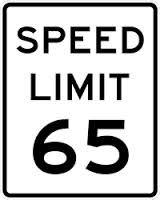
We do not require for you to appear in a trial de nova (court trial) to get our back guarantee. Even if the ticket is reduced but not dismissed we still honor our money back guarantee.
 Speed is a contributory factor in 17.5 percent of fatal crashes occurring on California highways. Despite the California Highway Patrol’s strenuous efforts regarding the enforcement of speed limits, the number of fatal and injury collisions related to speed continues to be a dilemma facing the CHP. With a solid foundation of policies and procedures in place, the CHP relentlessly engages violators of California speed laws in an effort to reduce speed-associated collisions.
Speed is a contributory factor in 17.5 percent of fatal crashes occurring on California highways. Despite the California Highway Patrol’s strenuous efforts regarding the enforcement of speed limits, the number of fatal and injury collisions related to speed continues to be a dilemma facing the CHP. With a solid foundation of policies and procedures in place, the CHP relentlessly engages violators of California speed laws in an effort to reduce speed-associated collisions.
In great majority of CHP speeding tickets the officers follow the CHP’s policies and procedures to issue valid and justified CHP speeding tickets. However, there are a number of CHP speeding tickets that the accused violators are adamantly convinced that they did not exceed the posted speed limit and they were wrongly accused of speeding. It is important to note that the CHP officers do not intend to issue bad CHP speeding tickets yet there are many factors that can contribute to the erroneous speed detection by RADAR or LIDAR, speed pacing or even speed detection by the CHP air operations unit.
Majority of CHP speeding tickets are issued based on the CHP officer’s reliance on an electronic speed detection device such as speed RADAR or speed LIDAR. As a result, the CHP has strict requirements for training the officers to use speed Radar or speed Lidar to ensure that bad CHP speeding tickets are not issued to the motoring public.
CHP’s Radar Operator Training Program
The California Highway Patrol’s Basic Radar Operator Training course is designed to provide CHP Officers a solid foundation in the set-up and use of the speed Radar. Instruction is governed by a POST-certified class covering a total of 54 hours (24 classroom hours, 30 field training hours). Patterned after the NHTSA, “Basic Training Program in Radar Speed Measurement,” the CHP’s radar training program educates CHP officers on the proper methods for testing, deploying, and utilizing the CHP speed Radar, along with identification of various malfunctions and interference that could cause potentially false and inaccurate readings to occur. Other areas of emphasis include California and nationwide statutory law and case law, as well as CHP officer safety issues pertaining to proper handling of the speed Radar in regards to minimizing microwave radiation exposure. At the conclusion of the classroom portion of the course, CHP officers are required to pass a final written examination. CHP Officers are then required to conduct 100 field speed and distance estimations and pass a test consisting of five stationary and five moving-mode estimations in the field. Upon successful completion of the program and satisfying these requirements, CHP officers are authorized to deploy the speed Radar for speed enforcement purposes.
The California Highway Patrol now has an approximate total of 3,700 speed radar units deployed in the field. This figure includes 700 hand-held, 2,500 patrol vehicle-mounted, and 500 motorcycle-mounted radar units.
CHP’s Lidar Operator Training Program
LIDAR - Light Detection & Ranging
The CHP’s Basic Lidar Operator Training course is an eight-hour California POST- certified class designed to give CHP officers a foundation in the use of the Lidar speed detection system. Lidar speed detection is an optical remote sensing technology that measures properties of scattered light to find range and/or other information of a distant target. The prevalent method to determine distance to an object or surface is to use laser pulses. Like the similar speed Radar technology, which uses radio waves instead of light, the range to an object is determined by measuring the time delay between transmission of a pulse and detection of the reflected signal. Speed Lidar technology is small enough to be mounted in a hand held camera “gun” and permits a particular vehicle’s speed to be determined from a stream of traffic. Unlike speed Radar, which relies on Doppler shifts to directly measure speed, police Lidar relies on the principle of time-of-flight to calculate speed. CHP Officers attending the Lidar course are required to first be certified as basic speed Radar operators, due to the fact that principles of deployment and applicable statutory and case laws are essentially the same as the Police Traffic Radar System (PTRS).
CHP’s Educational Programs
As part of CHP’s efforts to educate the motoring public about the importance of safe driving and following the rules of the road, the CHP also utilizes speed trailers and also provides the CHP officers with the discretion to issue a verbal warning to drivers in an effort to educate without issuing fines.
Special Traffic Education Radar – Speed Trailers
Special Traffic Education Radar (SPECTER), or the CHP speed trailer, is a portable, self-contained speed display unit that is towed to previously identified sites experiencing speed-related problems. SPECTER trailers can greatly improve safety for pedestrians and motorists by relating necessary and helpful information to drivers as they enter designated school and work zones or high pedestrian areas. The CHP speed trailers are generally used in response to requests from local citizens about speeding traffic complaints. In 2008, the CHP was able to purchase 23 additional speed trailers that feature changeable message sign displays to alert motorists of their speed. These CHP speed trailers are equipped with radar; however, they can also be programmed with informational messages. This aspect makes them valuable during critical incidents or special speed enforcement periods. Instead of just being able to focus on speed education, the CHP can now alter the message, while still using the speed education portion. The CHP now deploys a total of 100 conventional speed trailers and 24 new changeable message sign trailers in California.
CHP Verbal Warnings
While enforcing traffic laws, CHP officers have the discretion to choose to issue a citation for the violation or educate the motoring public by extending a verbal warning to the violator. With the primary objective of educating the motorist during the enforcement encounter, a verbal warning can be an effective alternative in achieving this goal. The action of issuing a written citation is merely an extension of a verbal warning, usually coupled with a fine assigned by the magistrate having jurisdiction over that respective highway. While the numbers of verbal warnings issued are documented, the types of violations are not. There is no differentiation between a verbal warning issued for excessive speed and one issued for a mechanical violation.
Most likely the reason you are on this website is that you were issued a Traffic Ticket in California. If so, you are in the right place. If you have decided to contest a traffic ticket with a trial by written declaration we can help prepare your documents for you. We specialize in fighting traffic tickets for infractions and over many years and we have helped thousands of people to successfully beat their traffic tickets.
Traffic tickets can damage a person’s driving record and consequently impact automobile insurance premiums and cost a lot of money over the years. So, if you have decided to contest your traffic ticket we can help by preparing all the necessary documents for you for a trial by written declaration with the goal of getting a dismissal of the ticket.
We offer a 100% Money Back Guarantee of our $99 flat fee in the event that the traffic ticket is not dismissed. NO Gimmicks, No Forms to fill, No Hoops to jump through. Just send us the court’s decision letter showing you were found guilty and the ticket was not dismissed. After we verify the information, we will issue you a 100% refund of our $99 flat fee. It’s that simple, see Our Guarantee Page.
Legal Disclaimer and Notice to Consumer: The information obtained from 2FixYourTrafficTicket.com hereafter referred to as FYTT and this website is intended to provide you only with general information. In short, the use of this website and the free informational or educational materials and any services provided by FYTT is not legal advice and it is not a substitute for advice from an attorney and should be used on “as is” basis. The Services of FYTT are provided by a registered and bonded Legal Document Assistant in LA County LDA2014166284 Valid through 6/17/2024. You may contact LA County registrar recorder at P.O. BOX 1208 Norwalk, CA 90650 or at 562--462-2177 or at lavote. net. A Legal Document Assistant cannot provide legal advice and can only provide self-help services like preparing, completing, or filing legal documents or forms at your specific direction and supplying you with attorney-approved written material for your self-help needs. If you choose to use this site or services provided by FYTT you agree that the free information provided on this website and information given by FYTT representatives, employees, attorneys or agents is not legal advice and no Attorney-Client relationship is created. FYTT is NOT A LAW FIRM, does not practice law, does not give legal advice, any opinion or recommendations about legal remedies, legal rights, legal defenses, or legal options. FYTT is allowed to complete legal documents in a professional and ministerial manner at the specific direction of the client. The representatives, agents and principles of FYTT are not acting as your attorney. Instead, you are representing yourself in any legal matter you undertake with the use of FYTT’s services regarding your traffic ticket. You may contact us at 6442 Platt Avenue, #203, West Hills, CA 91307 or 877--814-7542.